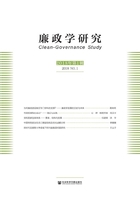
六 结语
本文旨在从理论和实践的角度探讨如何测量反腐败的成效。实践表明,成功的腐败治理往往包括一些基本要素,如改革者的决心、反腐资源的整合、健全的法律制度、强有力的反腐机构、民众的支持,以及社会对腐败的零容忍。中国香港为此提供了一定的佐证。基于香港的经验,我们提出,只有做到以下方面的腐败治理才算得上成功:多维度的治理、全方位的参与和深层次的预防。其中多维度治理指的是反腐败上下结合,多管齐下;全方位参与则要求动员各种社会力量对腐败形成遏制,使之无处藏匿;而深层次的预防强调的是培育廉洁的社会氛围,从根本上消除腐败滋生的土壤。香港在廉政公署的引领下,以社会力量为依托,在肃贪倡廉方面取得了有目共睹的成果。香港廉政公署的宣传口号“香港,胜在有你和ICAC”是对香港成功经验的高度概括。
必须指出的是,反腐败的路径很大程度上受到各个国家和地区具体情况的约束,很难找到具有普遍意义的成功方案。提出衡量反腐成功的标准只是为了确定目标和方向,并非鼓励照搬照抄。不同的国家和地区处在不同的发展阶段,应当根据自己的特殊情形探索构建清廉社会之路。
参考文献
Barr,A. & Serra,D. 2010. “Corruption and Culture:An Experimental Analysis.” Journal of Public Economics 11-12:862-869.
Batory,A. 2012. “Why do Anti-corruption Laws Fail in Central Eastern Europe?A Target Compliance Perspective.” Regulation & Governance 1:66-82.
Chatterjee,I. & Ray,R. 2012. “Does the Evidence on Corruption Depend on How It is Measured?Results from a Cross-country Study on Microdata Sets.” Applied Economics 25:3215-3227.
Gest,N. & Grigorescu,A. 2010. “Interactions among Intergovernmental Organizations in the Anti-corruption Realm.” The Review of International Organizations 1:53-72.
Gong,T. & Wang,S. 2013. “Indicators and Implications of Zero Tolerance of Corruption:The Case of Hong Kong.” Social Indicators Research 3:569-586.
Gong,T. 2008. “Objective Responsibility vs.Subjective Responsibility:A Critical Reading of the CCP’s Internal Supervision Regulation.” China Review:77-102.
Idemudia,U.,Cragg,W. & Best,B. 2010. “The Challenges and Opportunities of Implementing the Integrity Pact as a Strategy for Combating Corruption in Nigeria’s Oil Rich Niger Delta Region.” Public Administration and Development 4:277-290.
Lawson,L. 2009. “The Politics of Anti-corruption Reform in Africa.” The Journal of Modern African Studies 1:73-100.
Misangyi,V.F.,Weaver,G.R. & Elms,H. 2008. “Ending Corruption:The Interplay among Institutional Logics,Resources,and Institutional Entrepreneurs.” Academy of Management Review 3:750-770.
Quah,J.S. 2007. “Anti-corruption Agencies in Four Asian Countries:a Comparative Analysis.” International Public Management Review 2:73-96.
Quah,J.S. 2010. “Defying Institutional Failure:Learning from the Experiences of Anti-corruption Agencies in four Asian Countries” Crime,Law and Social Change 1:23-54.
Rimskii,V. 2013. “Bribery as a Norm for Citizens Settling Problems in Government and Budget-funded Organizations.” Russian Politics & Law 4:8-24.
Schatz,F. 2013. “Fighting Corruption with Social Accountability:a Comparative Analysis of Social Accountability Mechanisms’ Potential to Reduce Corruption in Public Administration.” Public Administration and Development 3:161-174.
Scott,I. 2013. “Institutional Design and Corruption Prevention in Hong Kong,” Journal of Contemporary China 79:77-92.
Serra,D. 2011. “Combining Top-down and Bottom-up Accountability:Evidence from a Bribery Experiment.” The Journal of Law,Economics & Organization 3:569-587.
Setiyono,B. & McLeod,R.H. 2010. “Civil Society Organisations’ Contribution to the Anti-corruption Movement in Indonesia.” Bulletin of Indonesian Economic Studies 3:347-370.
Themudo,N.S. 2013. “Reassessing the Impact of Civil Society:Nonprofit Sector,Press Freedom,and Corruption.” Governance 1:63-89.
Van Aaken,A.,Feld,L.P. & Voigt,S. 2010. “Do independent Prosecutors Deter Political Corruption?An Empirical Evaluation across Seventy-eight Countries.” American Law and Economics Review 1:204-244.
Wing-Yat,E.Y. 2013. “Anti-Corruption Approaches in Macao:Lawmaking and Legal Enforcement.” Journal of Contemporary China 79:93-108.
[1] 基金项目:本文获得香港政府研究资助局优配研究金(项目号9042104,9042596)和香港城市大学(课题号6354020)的资助。
[2] 作者简介:公婷,香港城市大学公共政策学系教授、复旦大学国际关系与公共事务学院特聘讲座教授;杨丽天晴,香港城市大学公共政策学系博士后;肖汉宇,香港教育大学亚洲及政策研究学系助理教授。
[3] 联合国中文官方网站,http://www.un.org/zh/issues/anti-corruption/uncac.shtml。
[4] 透明国际官方网站,https://www.transparency.org/news/feature/corruption_perceptions_index_2017。
[5] 独立的检察机构对抑制腐败也有非常显著的影响(Van Aaken et al.,2010)。
[6] 《公务员守则》,http://www.csb.gov.hk/tc_chi/admin/conduct/files/CSCode_c.pdf。
[7] 《廉政公署年度报告》(2016年),http://www.icac.org.hk/filemanager/en/content_27/2016.pdf。
[8] 香港廉政公署官方官网,http://www.icac.org.hk/sc/home/index.html。
[9] 《香港廉政公署年度报告》(1979~2016年)。
[10] 香港便览之“廉政公署”,http://www.icac.org.hk/tc/about/report/others/index.html。
[11] 香港工业贸易署中小企业支援与咨询中心网站,https://www.success.tid.gov.hk/tc_chi/aboutus/sme/service_detail_6863.html。
[12] 香港商业道德发展中心官方网站,http://www.hkbedc.icac.hk/tc_chi/publications/feature_articles.php?cat=3。
[13] 《香港廉政公署三管齐下,肃贪倡廉市民抽签参观》,http://hk.zijing.org/2017/0619/736635.shtml。
[14] 香港便览之“廉政公署”,http://www.icac.org.hk/tc/about/report/others/index.html。
[15] 参见香港廉政公署官网,http://www.icac.org.hk/tc/service/edcuate/other-sectors/index.html。